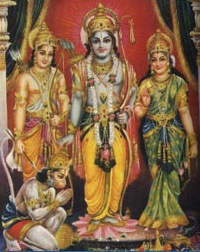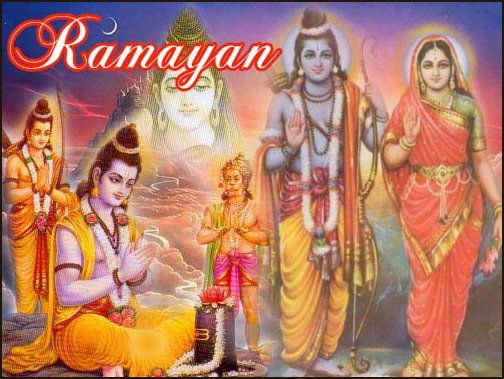
Ram, Sita, Laxman and Hanuman
|
Ramanavami celebrates the birth of Rama or Ramachandra. On the ninth day of the first fortnight of Chaitra the birth of Rama is commemorated. The story of Rama was first written by Vaalmeeki in about the 4th century B.C. Rama is supposed to have lived during the 8th or 7th century B.C. The epic known as the Ramayana. In some parts of India, it is a nine-day festival, coinciding with the Vasanta Navratri.
The public worship starts with morning ablutions, chanting Vedic mantras dedicated to Vishnu, and offering flowers and fruit to the god. People keep a fast throughout the day, breaking it only at midnight with fruit. In some parts of India, especially Bihar and Uttar Pradesh, public gatherings called satsangs are organised to commemorate the birth of Rama. Excerpts from the Ramacharitamanas, extolling the glory of Rama, are recited. People of all castes and creeds participate in these gatherings to listen to the stories and their explanations offered by the learned.

Ramayan
|
The country of Kosal was situated on the banks of the river Sharayu. Ayodhya was the capital founded by the king rishi Manu. During the reign of king Dasarath, Ayodhya reached a period of great prosperity. But Dasarath faced a big problem: he had no children. Therefore he decided to perform a sacrifice known as “ashvamedh”, or horse-sacrifice. Elaborate and difficult rituals had to be observed. A very holy man, rishi Rishyashring, was chosen to conduct the sacrifice with the utmost accuracy. The performance of this sacrifice was a great event in Ayodhya. At the end Rishyashring recited a mantra and made an offering to the fire. Then the gods, gandharvas, siddhas, and rishis present arid began to pray to Brahma.
At that time Ravan, king of Lanka, was terrorizing the people, and all were longing for liberation from his menace. Ravan had acquired great power because he had obtained from god Brahma the boon that he would never die at the hands of gods, or gandharvas, or yakshas (demigods) or demons. As he was not afraid of men he did not care to include men in the list of his potential slayers. So Brahmadev declared that Ravan would die at the hands of a man. Then the gods went to Vishnu with the request, “Dasarath is a glorious king. Please, take birth in the wombs of his three queens in four different degrees of your divinity.”
When Dasarath’s sacrifice came to an end a shining figure appeared over the sacrificial kund, and offered the king a divine beverage called “payasam” to be given to his queens Kausalya, Kaikayi, and Sumitra. In due time Kausalya gave birth to Rama, Kaikayi to Bharat and Sumitra to Laxman and Shatrugna. Rama was born at noon of the bright ninth day of Chaitra. He was believed to be the embodiment of half degree of Vishnu’s divinity, (ardha ounsh).
